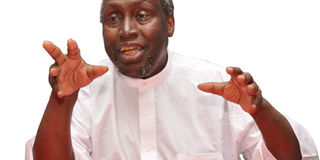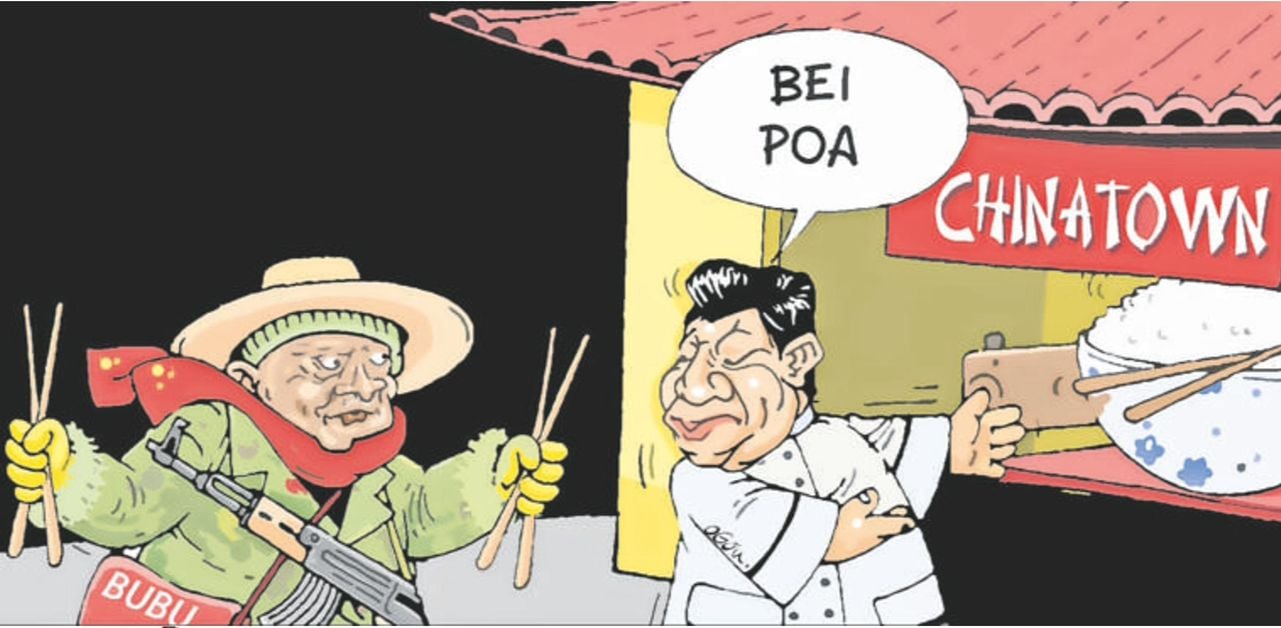Prime
Sharing a class with Literary laureate Ngugi wa Thiong’o

Ngugi Wa Thiong’o, one of Africa’s best writers, speaking at the 50th anniversary of the University of East Africa. FILE PHOTO
What you need to know:
Ngugi wa Thiong'o, a celebrated literature laureate was in the country in June to attend the 50 years of the University of east Africa anniversay. The Daily Monitor tracked down Peter Nazareth, one of his former classmates and he spoke about what it means to study with the great novelist.
What it was like being in the same class with Ngugi
Being in the same class as Ngugi was not a problem but joy. Once I had graduated, I wanted to learn things by myself. I did not want to continue studying formally but to learn. That is why I went to teach at St Mary’s College, Kisubi. One of the best ways of learning is by teaching. I was the first Asian to teach at St Mary’s, as far as I know.
When Ngugi and I attended classes together, we attended what at the University of Iowa are called “electives”, namely, courses we wanted to take. We both attended lectures by Arnold Kettle and also attended a seminar on the novel [An Introduction to the English Novel] by him. Both of us thought that Kettle’s courses were the best of the best.
Ngugi was a very humble man and so knowledgeable. His two-volume book on the novel was brilliant. After the classes and the seminar, Ngugi and I used to discuss what we had learned.
Did you know Ngugi as a writer?
Ngugi was a visionary, a political thinker, a person who keeps growing, who is persistent. It is not easy to be a novelist. And when everyone thinks you are done, you write a novel of a thousand plus pages (edited to 768), a novel which is funny and deep and readable. I taught the novel in my African literature class this Spring and students loved Ngugi’s novel. They did not find it difficult to read.
The essay published on this novel, Wizard of the Crow, edited by Oliver Lovesey is by my former student, Steve Ellerhoff. Ngugi taught us how to pursue your vision without staying at one point.
This is both strategy and growth. I said to Ngugi when we met some years ago that 90 per cent of what I teach my students is what I taught myself. “That is the best way,” said Ngugi.
How distinctive did you find Prof Ngugi?
I never found Ngugi to be arrogant. But he has faith in his vision and pursues it. In this sense, he is like a prophet. He has always wanted to tell the story and to change society and the world.
He never gives in to pessimism, he does create characters, juxtaposes them with characters who do not give up but who learn, and if they do not, he does not “sell out” as a writer. I think he knows he has a gift as a writer and he does not exploit it. I don’t think he seeks any public honours and because of this, they come to him. We can learn from this, in our own way.
Ngugi produced his first book The Black Hermit, for Uganda’s Independence Celebrations and I wrote a review of the play.
He was still a student at Makerere and I was teaching at St Mary’s, Kisubi. I think a good reviewer/critic can learn from the text and contribute to the growth of the writer.
Was much of your education in Uganda?
I started studying at Makerere University College (as it was known then) in 1957. I had studied at Kololo Secondary School. In those days, we studied at Makerere for the Preliminary Arts for two years [instead of the High School Certificate]. After those two years, studying three subjects, we were accepted to study for a degree if we did well enough in the final exams.
Ngugi and I lived in two different halls of residence. I was in Mitchell Hall [the old Mitchell, which was closed in 1962] on one side of the hill, not very far from Mary Stuart Hall and Ngugi was in Northcote Hall [Current day Nsibirwa Hall], on the other side of the hill. Ngugi soon acquired a reputation as a writer. His first one-act play was performed at the English Department Inter Hall Competition in early 1962. My play Brave New Cosmos was performed at the same competition. It was my third one-act play and was later produced by the BBC African Theatre.
Did he inspire you with his works?
Ngugi struck me (and many other students) as a visionary who was therefore dedicated as a writer.
We were both editors of Penpoint, the English Department magazine: I was on the first editorial board and he was on the board in 1961 when I left it to prepare for my final exams.
After I took my exams, I had a special meeting with Ngugi, sitting on the lawn outside the canteen. I told him of the strategies I had discovered how to do well in the final exams on which our degree was based. He told me about all the African writers he had read and that was my deep initiation into African literature.
I taught at St Mary’s Kisubi (with Pio Zirimu, who became a good friend at Makerere) and continued to go to Makerere to meet Ngugi. I read the manuscript of his first novel, published later as The River Between, when it was called The Black Messiah, and gave him suggestions for improving it.
After a year of teaching (at St Mary’s and then my alma mater, Secondary School, Kololo) I went to Leeds to do postgraduate work. Pio Zirimu was also there with me, as was his wife Elvania (doing her first degree) and Grant Kamenju (also a friend from my Makerere days). Ngugi joined us as a postgraduate student the following year. It was during that time that we all (including Ime Ikiddeh from Nigeria) became very close friends and discussed writing and politics.
It was at that time too that I read and was inspired by Ngugi’s essays on [Joseph] Conrad [author of heart of darkness] which he wrote for his special project in his last year at Makerere. I was very inspired by his essay on Conrad’s Nostromo. I drew a lot from this essay in my dissertation at Leeds, for which I continue to give him credit.
In fact, I only began reading and re-reading Conrad because of Ngugi. I felt that if Ngugi loved the work of Conrad, then I should read and re-read it until I understood it.
So it is fitting that in December, 2012, a book Teaching Approaches to Ngugi wa Thiong’o edited by Prof Oliver Lovesey was published by the Modern Language Association contained my essay on A Grain of Wheat in dialogue with Conrad.
What do you currently do?
I am the professor of English and African-American studies at the university of Iowa in Iowa City where I and my wife work for the International writing programme, which brings in writers from all over the world in the fall for 10 weeks.




